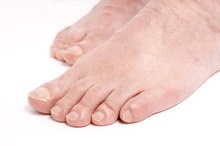What Causes the Blood Glucose Level to Increase in Liver Damage?
Chronic liver damage can result in the replacement of normal liver tissue with non-functioning scar tissue. Advanced liver damage is called cirrhosis, and glucose intolerance is a common feature of this condition 2. An article in the January 2009 issue of the “World Journal of Gastroenterology” reports that greater than 90 percent of people with liver cirrhosis are glucose intolerant, and nearly 30 percent will develop diabetes 12. Liver cirrhosis is irreversible and can be the result of alcoholic liver disease, hemochromatosis, non-alcoholic fatty liver disease or chronic hepatitis C infection.
Muscle Insulin Resistance
The liver is the primary disposal site of insulin; when the liver is damaged, less insulin is taken up and degraded, causing a condition of chronic hyperinsulinemia. A study in the July 1998 issue of “Hepatology” reports that hyperinsulinemia in patients with liver cirrhosis causes muscle insulin resistance 3. Another study in the March 1994 issue of “Hepatology” reports patients with cirrhosis exhibit metabolic abnormalities consistent with muscle tissue insulin resistance. This means that in people with impaired liver function, glucose is not as efficiently removed from the blood by muscle tissue, leading to a chronic elevation of blood glucose levels.
- The liver is the primary disposal site of insulin; when the liver is damaged, less insulin is taken up and degraded, causing a condition of chronic hyperinsulinemia.
- Another study in the March 1994 issue of “Hepatology” reports patients with cirrhosis exhibit metabolic abnormalities consistent with muscle tissue insulin resistance.
Liver Insulin Resistance
High Liver Enzymes & High Blood Sugar
Learn More
In people who have cirrhosis, insulin resistance eventually develops in the liver also. When the liver is less sensitive to insulin, it is no longer as effective in removing excess glucose from the blood or in converting glucose into the glucose-storage molecule, glycogen. As a result, blood glucose levels are higher, especially after a meal.
Islet Injury
Chronic insulin resistance and the resultant high circulating levels of glucose and fats eventually destroy the insulin-secreting cells, called islets, in the pancreas. This leads to the development of overt diabetes where insulin levels are insufficient to regulate glucose metabolism. The study in “Hepatology” also reported that insulin secretion is reduced in patients with cirrhosis, indicating islet injury.
Related Articles
References
- “World Journal of Gastroenterology”; Liver Cirrhosis and Diabetes: Risk factors, Pathophysiology, Clinical Implications and Management; Diego Garcia-Compean et al.; January 2009
- PubMed: Pathogenesis of Glucose Intolerance and Diabetes Mellitus in Cirrhosis
- PubMed: Insulin Resistance in Cirrhosis: Prolonged Reduction of Hyperinsulinemia Normalizes Insulin Sensitivity
- Centers for Disease Control and Prevention (CDC). National Vital Statistics Report, Volume 67, Number 5. https://www.cdc.gov/nchs/data/nvsr/nvsr67/nvsr67_05.pdf. Published July 26, 2018.
- National Institute of Diabetes and Digestive and Kidney Diseases. Cirrhosis. https://www.niddk.nih.gov/health-information/liver-disease/cirrhosis#signs
- FastStats - Chronic Liver Disease or Cirrhosis. Centers for Disease Control and Prevention. May 30, 2013.
- Guss D, Sherigar J, Mohanty SR. Missed Diagnosis of Liver Cirrhosis Leads to Disparities in Care for Older Patients. Gastroenterology Res. 2018;11(5):333-339. doi:10.14740/gr1074w
- Symptoms & Causes of Cirrhosis. National Institute of Diabetes and Digestive and Kidney Diseases. Mar 1, 2018.
- Cirrhosis: MedlinePlus Medical Encyclopedia. MedlinePlus. Sept 11, 2019.
- Cirrhosis: MedlinePlus Medical Encyclopedia. MedlinePlus. Sept 11, 2019.
- Nderitu P, Bosco C, Garmo H, et al. The association between individual metabolic syndrome components, primary liver cancer and cirrhosis: A study in the Swedish AMORIS cohort. Int J Cancer. 2017;141(6):1148-1160. doi:10.1002/ijc.30818
- Hung TH, Liang CM, Hsu CN, et al. Association between complicated liver cirrhosis and the risk of hepatocellular carcinoma in Taiwan. PLoS ONE. 2017;12(7):e0181858. doi:10.1371/journal.pone.0181858
- Cirrhosis of the Liver Prevention. Cleveland Clinic. Jan 11, 2019.
- Centers for Disease Control and Prevention (CDC). National Vital Statistics Report, Volume 67, Number 5. Published July 26, 2018.
- National Institute of Diabetes and Digestive and Kidney Diseases. Cirrhosis.
Writer Bio
Melissa Lingohr-Smith is a freelance medical writer with over 10 years experience in research science, teaching and scientific writing. She has published scholarly articles, received grant funding in diabetes research and is experienced in biochemistry, molecular biology, endocrinology, physiology, toxicology, pharmacology, clinical studies and FDA approvals. She has a Ph.D. in pharmacology/toxicology.








